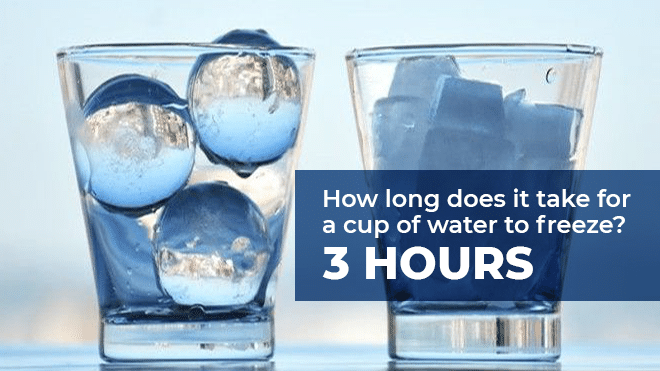The time how long does it take for water to freeze depends on various factors such as temperature, volume of water, and presence of impurities. Under typical conditions, pure water freezes at 0 degrees Celsius (32 degrees Fahrenheit). However, the freezing process is not instantaneous.
The time it takes for water to freeze can vary. In general, smaller volumes of water freeze more quickly than larger volumes because there is less mass to cool down. Additionally, the temperature of the environment also affects the freezing time. Colder temperatures will accelerate the freezing process.
Under normal conditions, you can expect a small volume of water, like a glass of water, to freeze within a couple of hours in a typical freezer set at 0 degrees Celsius (32 degrees Fahrenheit). Larger volumes, such as a bucket or a pond, may take significantly longer, potentially several hours or even days.
It’s important to note that the presence of impurities in water, such as dissolved minerals or particles, can lower the freezing point and affect the freezing time. For example, saltwater freezes at a lower temperature than pure water due to the presence of salt.
Overall, the time it takes for water to freeze can vary depending on several factors, but at the freezing point of 0 degrees Celsius (32 degrees Fahrenheit), it generally takes a few hours for small volumes of water.
FAQs
Q: How long does it take for water to freeze?
A: The time it takes for water to freeze depends on various factors such as temperature, volume of water, and presence of impurities. Under typical conditions, pure water freezes at 0 degrees Celsius (32 degrees Fahrenheit). Smaller volumes of water freeze more quickly than larger volumes and colder temperatures accelerate the freezing process. A small glass of water may freeze within a couple of hours in a standard freezer set at 0 degrees Celsius (32 degrees Fahrenheit), while larger volumes may take several hours or even days to freeze completely.
Q: Do impurities affect the freezing time of water?
A: Yes, impurities in the water can affect the freezing time. Pure water freezes at 0 degrees Celsius (32 degrees Fahrenheit), but the presence of impurities can lower the freezing point and impact the freezing time. For example, saltwater freezes at a lower temperature than pure water due to the presence of salt. Impurities can act as nucleation sites, providing surfaces for ice crystals to form, which can speed up the freezing process in some cases. However, certain impurities can also hinder freezing and make the process slower.
Q: What factors can affect the freezing time of water?
A: Several factors can influence the time it takes for water to freeze. These include:
- Temperature: Lower temperatures accelerate the freezing process.
- The volume of water: Smaller volumes freeze faster than larger volumes because there is less mass to cool down.
- Agitation: Stirring or moving the water can help distribute the cold temperature and speed up freezing.
- Container Material: Different materials conduct heat differently, affecting the rate of cooling and freezing.
- Impurities: Dissolved minerals, particles, or impurities in the water can impact the freezing point and freezing time.
Q: Can water freeze instantly?
A: Under normal circumstances, water does not freeze instantly. Freezing is a gradual process that involves the removal of heat energy from the water until it reaches its freezing point. However, there are certain techniques like flash freezing or supercooling that can allow water to freeze quickly or even instantly under specific conditions. These techniques involve rapid cooling or removing impurities from the water to create supercooled states, where the water remains liquid below its freezing point until disturbed, at which point it rapidly freezes. However, these methods are not typically encountered in everyday situations.
Read This: How to Grow a Moustache a Guide to Facial Awareness Lifestyle
